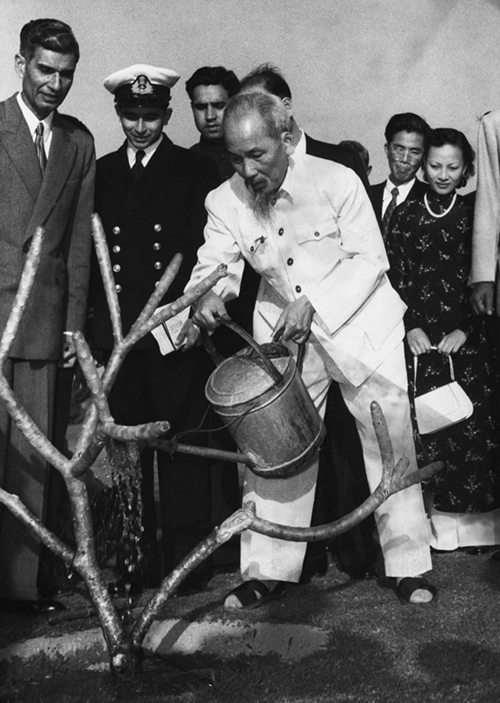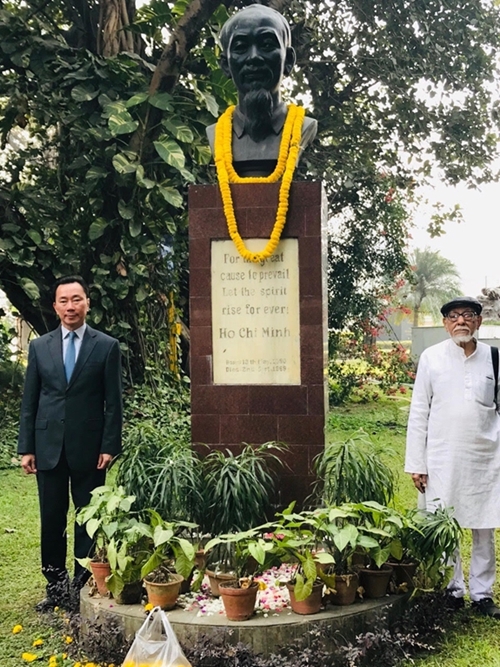Reporter: President Ho Chi Minh is a symbol of solidarity and friendship between Vietnam and other countries. How is this reflected in the relationship between Vietnam and India, Mr. Ambassador?
Ambassador Pham Sanh Chau: It can be said that the relationship between Vietnam and India is particularly reliable and cohesive thanks to the similarities in the thoughts of the two great leaders: Ho Chi Minh and Mahatma Gandhi. Though the two revolutionary leaders never met, their respect and admiration for each other has inspired all peace-loving people around the world. Meanwhile, the faithful and long-lasting friendship between President Ho Chi Minh and Indian Prime Minister Jawaharlal Nehru, the first Prime Minister of India, laid a solid foundation for India - Vietnam relations. As a result, the two nations have stood side by side throughout all of the turbulence in history. President Ho Chi Minh considered Vietnam - India relations to be the relations of “brotherhood,” while generations of Indian leaders have always shown their confidence that the solidarity and friendship between the two countries would always be strengthened over time, as it has been fostered by the shared ideal of national independence, peace, mutual trust and cooperation.
    |
 |
|
Uncle Ho plants a frangipani tree next to the tomb of Mahatma Gandhi. A file photo |
Reporter: Could you please tell us about how President Ho Chi Minh has been honored in India?
Ambassador Pham Sanh Chau: President Ho Chi Minh visited India three times in his life. The first time he visited India was in 1911 while he was on the way to saving the nation. The second time was in 1946. He was then head of state, stopping over in India on the way to France for peace talks. The third time was in 1958. This time, he was President of the Democratic Republic of Vietnam on a 10-day official visit to India. In all the visits, Uncle Ho always left a deep impression on the Indian people. During the official visit, thousands of Indians took to the streets to warmly greet him.
For the Indian people, the image of Vietnam is always associated with the image of Uncle Ho. In our struggle for independence, a lot of Indians joined demonstrations in support of the struggle for peace in Vietnam, led by President Ho Chi Minh. The slogan “My name is Vietnam; your name is Vietnam; our name is Vietnam; Ho Chi Minh - Dien Bien Phu” was chanted all along Indian streets. Many Indian scholars, writers, and poets have published books on the life and career of Ho Chi Minh, praising his greatness and also his simplicity.
Honoring President Ho Chi Minh in India is both a cultural diplomatic activity and a regular activity of the Vietnamese Embassy in India. In Kolkata city, there is a bust of Uncle Ho in a park and an avenue, on which the Consulate General of the United States is located, is named after him. In New Delhi, there is a large avenue named after Uncle Ho. Every time when I travel on or pass by this avenue, the GPS device often reads aloud the name Ho Chi Minh. The Vietnam - Ho Chi Minh corner has been debuted at the National Library and the Central Library of India.
Every year, the Vietnamese Embassy in India organizes seminars, workshops, photo exhibitions, film screenings, and contests on President Ho Chi Minh. Currently, the Indian Post is working with the embassy to design a set of stamps on Uncle Ho. The set of stamps was planned to be launched on the occasion of his 130th birthday, but due to the COVID-19 epidemic, it has been postponed.
Reporter: What do you think is the significance of honoring President Ho Chi Minh in foreign countries for Vietnam in its cooperation with other countries?
Ambassador Pham Sanh Chau: Previously, as Director of the Department of Foreign Cultural Affairs and UNESCO under the Ministry of Foreign Affairs, I tried to find a new way to promote the image of Vietnam. I then found out that some countries use images of individuals like Mahatma Gandhi of India, Confucius of China, and Pushkin of Russia to build their national images. Therefore, I thought that Vietnam should promote the image of Uncle Ho, who was honored in a UNESCO resolution as the Vietnamese hero of national liberation and great man of culture. This will help promote the honoring of Uncle Ho as an outstanding Vietnamese, serving to boost cultural diplomacy and strengthen friendly relations and people-to-people exchanges between Vietnam and other countries.
    |
 |
|
Ambassador Pham Sanh Chau (L) beside a bust of President Ho Chi Minh in India |
Reporter: What do you think about the sentiment of the Indian people in general and politicians in particular towards President Ho Chi Minh?
Ambassador Pham Sanh Chau: In his speech welcoming President Ho Chi Minh to India in February 1958, Indian Prime Minister Jawaharlal Nehru said: We have welcomed distinguished guests from many countries, but Ho Chi Minh is unique. None of the precious guests before were as simple as him and he is so appealing to the Indian. This is the man with a great heart and welcoming him seems to make us grow up!
Having worked in India for one year and a half, I have traveled to almost all of the 28 states and territories of India and met many politicians, businessmen, artists, scholars, and journalists. They always talk about Ho Chi Minh with respect, in the same way Prime Minister Jawaharlal Nehru did. The stories, items, and places that bear Uncle Ho’s image in all parts of this country make me feel at home in India.
I met an Indian writer who wrote many books about Ho Chi Minh. He said he still remembers every word and gesture of Uncle Ho when he was speaking to thousands of Indians in Kolkata during his visit in 1958. I met a big Indian businessman who proudly started the conversation with me that his wife had been given candies by Uncle Ho when she followed her father during his diplomatic mission in Vietnam. When I visited the tomb of Mahatma Gandhi earlier this year, I felt so touched standing under an over-60-year-old tree, brought there from Vietnam by Uncle Ho when visiting India in 1958. I was amazed to see Uncle Ho’s autograph sent to his adopted daughter Indira Gandhi when I visited Prime Minister Indira Gandhi’s memorial house. I usually stay at Lalit Great Eastern Hotel whenever I am on a business trip to Kolkata, simply just to see his image because in 1946, Uncle Ho stayed at the hotel when he was on his way to Paris for peace negotiation.
Reporter: Kolkata is a city where the people have special sentiment for President Ho Chi Minh. Could you please share stories about the affection and admiration of the people and government of this city for the beloved leader of Vietnam?
Ambassador Pham Sanh Chau: Kolkata, the capital city of West Bengal state, is the first locality in India to have a road named after Ho Chi Minh. The people there said they love President Ho Chi Minh, so they decided to name a big and beautiful road in the center of the city after Ho Chi Minh. The city government then officially named the road intersecting with Jawaharlal Nehru Road Ho Chi Minh. This is also the first city in India to erect a bust of President Ho Chi Minh. It was placed on a two-meter high pedestal and inaugurated by General Vo Nguyen Giap in 1991.
Kolkata is also home to the India-Vietnam Solidarity Committee, established in 1970 to show the Indian people’s support for the struggle for national independence of the Vietnamese people. Geetesh Sharma, the committee’s President, now 90 years old, has a special love for Vietnam and Uncle Ho. Under his leadership, members of the committee have made important contributions to promoting the friendship between the two peoples over the past 40 years. The committee also regularly organizes seminars and publishes books about Uncle Ho, and joins other events related to Ho Chi Minh. Geetesh Sharma himself went to Vietnam 29 times to participate in exchange activities and promote mutual understanding. The committee still maintains close relationships with friendly organizations in Vietnam and regularly welcomes Vietnamese missions.
Reporter: Thank you, Ambassador!
Reported by My Hanh
Translated by Huu Duong